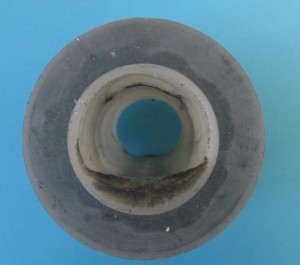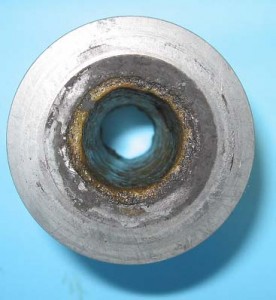Experimental Investigation of Paraffin-Fueled Hybrid Combustion
Students: Shani Ben-Basat (Sisi), Dr. Alexandra Lazarev
Supervisor: Prof. Alon Gany
Experimental investigation of a laboratory hybrid motor employing paraffin fuel and gaseous oxygen as oxidizer. Traditional solid fuels (polymers) used for hybrid rocket engines have a relatively low burning rate implying low thrust. To increase thrust a use of non-polymeric fuels providing a much higher regression rate has been suggested. Several types of paraffin have been tested. The investigation reveals that paraffin-based fuels exhibit regression rates 3-5 times higher than polymeric fuels but have poor mechanical characteristics. Addition of polymer to paraffin improves the mechanical strength, and the resulting regression rate is still several times higher than that of the plain polymeric fuel.
Experimental investigation using paraphin-based fuels and gaseous oxygen or nitrous oxide oxidizers has been conducted. A model accounting for a number of mass loss mechanisms has been developed. It was shown that a proposed mechanism of a melt flow over the fuel regressing surface during combustion, may play a significant role in the overall fuel regression rate, particularly at relatively low oxidizer mass fluxes.
 |
 |
References
Lazarev, A. and Gany, A., “Initial Characterization of Wax as a Hybrid Motor Fuel”, Poster No. P7, 22nd Annual Symposium of the Israeli Section of the Combustion Institute, Tel Aviv, Dec. 21, 2006 (Book of Abstracts p. 24).
Lazarev, A. and Gany, A., “Experimental Investigation of Paraffin-Fueled Hybrid Combustion”, Poster No. 17-14, 3rd European Combustion Meeting, ECM 2007, Chania, Crete, Greece, April 11-13, 2007.
Gany, A., “Similarity and Scale Effects in Hybrid Rocket Motors”, Fundamentals of Hybrid Rocket Combustion and Propulsion, edited by M. Chiaverini and K.K. Kuo, Progress in Astronautics and Aeronautics, Vol. 218, AIAA, 2007, Ch. 12, pp. 487-509.

